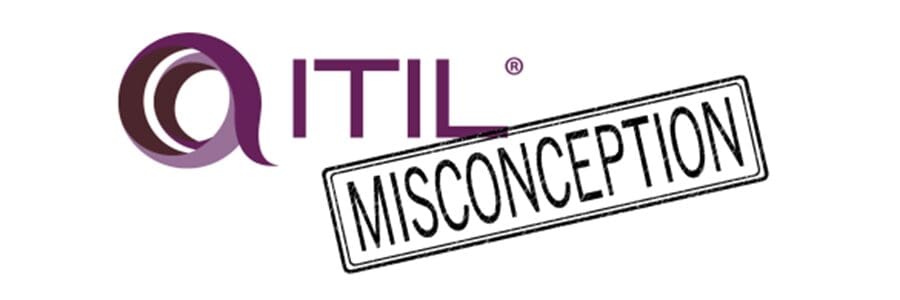What is ITIL?
Information Technology Infrastructure Library, or ITIL, is a widely accepted approach to IT Service Management (ITSM), which has been adopted by individuals and organizations across the world. ITIL provides a cohesive set of best practice, drawn from the public and private sectors internationally.
Click on each misconception to see if it is true or false.
#1: ITIL does not provide a common language for service management.
FALSE! A common language is provided, which can reduce misunderstandings and risk.
#2: ITIL should only be used for internal IT.
FALSE! In addition to internal IT, benefits of ITIL can be seen in relationships with other departments and partners/vendors and in the final product or service provided to the organization’s customers.
#3: ITIL is only for the Service Desk.
FALSE! While the service desk is a great place to start, ITIL can bring value throughout your entire IT department.
#4: ITIL adds more work than adds value for the business.
FALSE! When implemented properly, ITIL adds a lot of value to the business.
#5: ITIL is a standard to adhere to.
FALSE! Adopt and Adapt is one of ITIL’s guiding principles.
#6: ITIL should only be applied to the operations/infrastructure.
FALSE! The applications/projects side of IT will also benefit from applying ITIL properly.
#7: ITIL certification is more important than the work in practice.
FALSE! While the certifications are important to reduce the risk of an improper implementation, in the end they are only pieces of paper. Knowledge and experience are what counts.
#8: ITIL is not relevant to any service management business.
FALSE! While ITIL was created for IT, other service-oriented departments will benefit from its guiding principles.
#9: ITIL has answers to all IT challenges.
FALSE! While ITIL cannot answer every challenge in IT, following its nine guiding principles will reduce the number of challenges IT faces.
#10: ITIL is too complex.
ABSOLUTELY FALSE! Any organization can apply ITIL to their IT department.
#11: ITIL is a set of separate processes.
FALSE! There are no processes, but there are nine guiding principles.
#12: ITIL is rarely used outside of the UK.
FALSE! While ITIL originated in the UK, it is used throughout the entire world and certification exams are taken in more than 150 countries.
#13: ITIL requires a lot of people to cover all the roles.
FALSE! Many IT departments are “lean” on human resources and expect many of their team members to wear multiple hats. ITIL is well aware of this dynamic.
#14: ITIL means you have to reinvent the wheel.
FALSE! No one wants to start over and ITIL does not encourage you to. It takes what you have and makes it better.
#15: ITIL does not manage risks in line with business needs.
FALSE! Managing risk is the name of the game for every IT manager and ITIL provides tools to assist with risk management.
#16: ITIL is 'the same' as ITSM (IT Service Management).
FALSE! ITSM is the practice of managing IT operations as a service, while ITIL is a framework that provides guidance and best practices for ITSM.
#17: ITIL should only be used for big companies.
FALSE! In fact, ITIL is easy to implement in any size company with the right people at the helm.
#18: ITIL is not useful when it has not been fully adopted.
FALSE! One of ITIL’s guiding principle’s is to adopt and adapt. Even applying just a small portion of ITIL to your IT department will yield positive results.
#19: ITIL will become obsolete in the future.
FALSE! Because ITSM (IT Service Management) is driven both by technology and the huge range of organizational environments in which it operates, ITIL is constantly evolving.
#20: Delta Technology focuses solely on ITIL.
FALSE! Delta Technology focuses on solving complex problems. Sometimes that means introducing and implementing ITIL to strengthen an IT department, while sometimes it does not.



